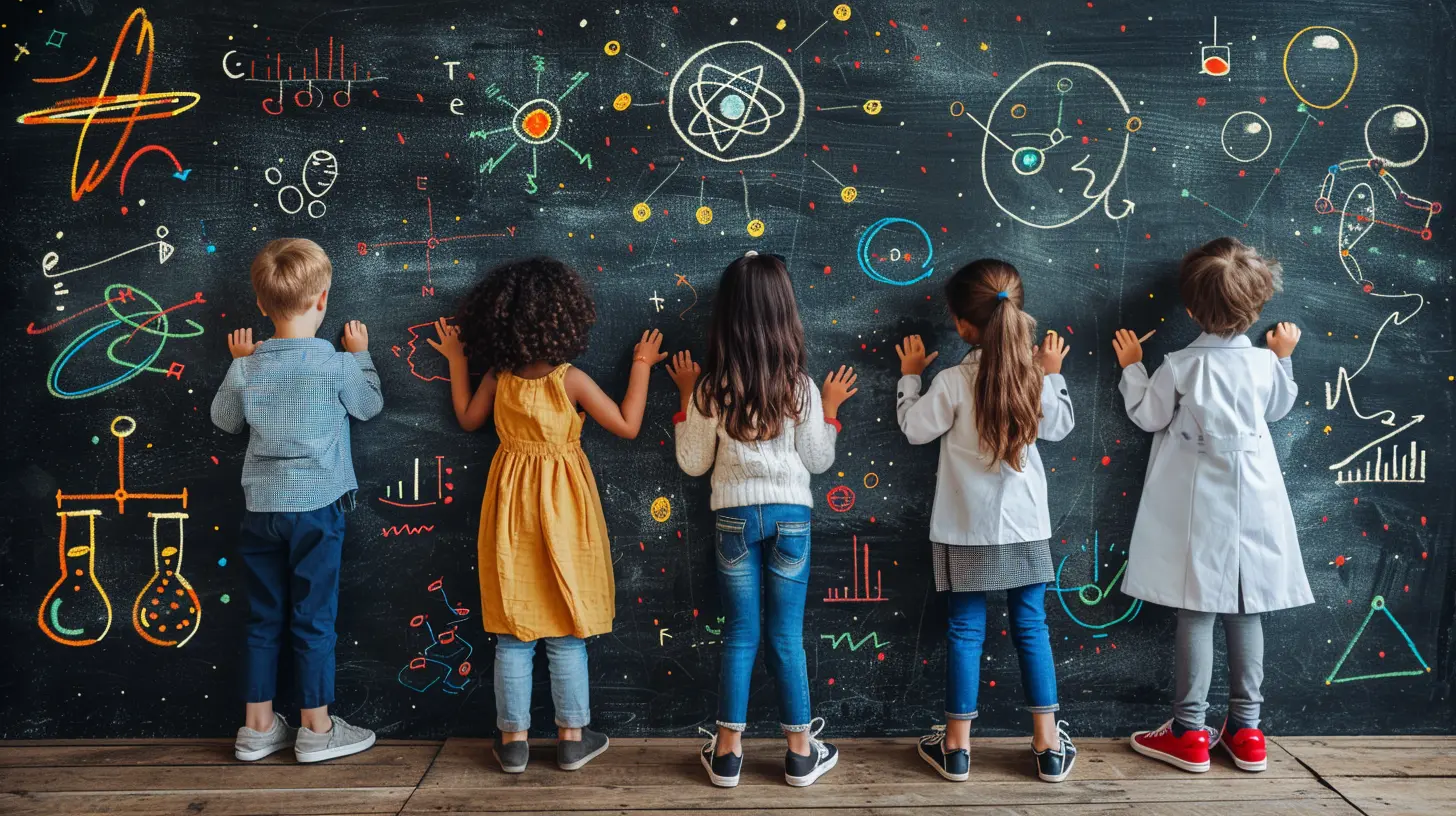The Importance of Teaching Scientific Literacy in the Digital Age
19 June 2025
Introduction
Let’s face it— we live in an era where information is constantly at our fingertips. One quick search on Google, and you have an overwhelming amount of answers. But how many of those answers are accurate? How do you separate fact from fiction? That’s where scientific literacy comes in.
In the digital age, where misinformation spreads like wildfire, teaching scientific literacy has never been more critical. It’s not just about understanding science; it’s about having the ability to think critically, evaluate evidence, and make informed decisions. Whether it’s about health, climate change, or even the latest diet trend, scientific literacy plays a vital role in shaping a well-informed society.
So, why is teaching scientific literacy so important? Let's dive right into it! 
What is Scientific Literacy?
Before we go any further, let’s break it down. Scientific literacy isn’t about memorizing complex formulas or being a genius in physics. Instead, it’s about developing a mindset that allows people to analyze information critically.A scientifically literate person can:
- Understand basic scientific concepts.
- Question and evaluate sources of information.
- Recognize bias and misinformation.
- Apply logical reasoning to real-world problems.
Essentially, scientific literacy helps people think for themselves instead of blindly accepting everything they see online. 
The Impact of the Digital Age on Information Consumption
The internet is a double-edged sword. On one hand, it gives us access to vast amounts of knowledge. On the other, it has also become a breeding ground for misinformation.Think about it—how often do you see misleading headlines, fake news, or "miracle" health cures being shared on social media? Without proper scientific literacy, people can easily fall for these misleading claims.
The Rise of Misinformation
With the rise of social media, anyone can claim to be an "expert" and share unchecked information. Unfortunately, false information spreads faster than accurate facts.For example, during the COVID-19 pandemic, misinformation about vaccines and treatments spread like wildfire. Many people fell victim to conspiracy theories simply because they lacked the tools to critically assess the information.
The Algorithm Problem
Ever noticed how social media platforms keep showing you similar content? That’s because algorithms tailor content based on your previous interactions. If someone starts watching conspiracy videos, they’ll likely get recommended even more, creating an echo chamber where misinformation thrives.This makes it even more important to teach scientific literacy so people can recognize manipulation and question their sources instead of blindly believing everything they see. 
Why Schools Should Prioritize Scientific Literacy
Teaching scientific literacy shouldn’t just be limited to scientists or researchers. It should be a fundamental part of our education system.1. Prepares Students for the Real World
Science is everywhere—from cooking to climate change to understanding how technology works. When students develop scientific literacy, they are better equipped to make informed choices about nutrition, healthcare, and even personal finances.For example, if a student understands how vaccines work, they won’t be easily swayed by anti-vaccine propaganda.
2. Encourages Critical Thinking
Today’s students will be tomorrow’s decision-makers. By teaching scientific literacy, we equip them with the ability to:- Ask the right questions.
- Analyze data and sources.
- Make rational decisions based on evidence.
It’s not about teaching what to think; it’s about teaching how to think.
3. Helps Combat Fake News
With so much misleading information online, students need the skills to differentiate between credible sources and unreliable claims. Schools that emphasize scientific literacy help students develop a healthy sense of skepticism.Imagine a student reading a news article claiming that "chocolate cures cancer." A scientifically literate student would ask:
- Who conducted the study?
- Is there enough evidence to support this?
- Could this be a misinterpretation of the data?
These critical thinking skills are essential in an era of misinformation.
4. Encourages Scientific Curiosity
Science isn’t just about learning facts—it’s about curiosity. When students understand the "why" behind scientific concepts, they become more engaged in learning.For instance, instead of just memorizing Newton’s laws, they might start questioning how those principles affect everyday objects around them. A curious mind leads to innovation, and innovation drives progress. 
How Can We Teach Scientific Literacy Effectively?
So, how do we ensure that students develop strong scientific literacy skills? Here are a few practical approaches:1. Teach Students to Question Everything
Encourage students to ask:- "Where is this information coming from?"
- "Is there evidence to support this claim?"
- "Who benefits from spreading this information?"
When questioning becomes a habit, they become less likely to fall for misleading claims.
2. Promote Hands-On Learning
Science should be more than just reading textbooks—it should be an experience.- Conduct experiments in class.
- Encourage students to test hypotheses.
- Make learning interactive.
By doing so, students develop a deeper understanding of scientific principles rather than just memorizing them.
3. Use Real-World Examples
Link lessons to real-life examples to make them more relatable. For example, when discussing climate change, show its effects on their local environment.When students see the relevance of science in their everyday lives, they are more likely to stay engaged.
4. Introduce Media Literacy
Since much of today’s misinformation spreads through digital platforms, media literacy should go hand-in-hand with scientific literacy. Teach students how to:- Identify credible sources.
- Fact-check information.
- Spot biases in news articles and social media posts.
When students know how to navigate the digital world wisely, they make better-informed decisions.
The Long-Term Benefits of Scientific Literacy
The effects of scientific literacy extend far beyond the classroom. A scientifically literate society is:- More Informed – People make decisions based on facts rather than misinformation.
- More Rational – Individuals rely on evidence instead of fear-based narratives.
- More Innovative – Scientific literacy encourages problem-solving and innovation.
Whether it’s addressing global challenges like climate change or making personal decisions about health, scientific literacy empowers individuals to think critically and act responsibly.
Conclusion
In today’s digital era, where misinformation spreads faster than ever, teaching scientific literacy is no longer optional—it’s a necessity. By equipping students with the ability to think critically, analyze data, and question sources, we are preparing them to navigate an increasingly complex world.Scientific literacy is more than just understanding facts; it’s about developing a mindset that allows people to separate truth from fiction. And in a world drowning in misinformation, that skill is priceless.
So, let's prioritize scientific literacy in education—because the future depends on it.
all images in this post were generated using AI tools
Category:
Stem EducationAuthor:

Olivia Lewis
Discussion
rate this article
2 comments
Susan McPherson
This article highlights a crucial aspect of modern education: scientific literacy. In an era saturated with information, empowering students to critically evaluate sources and understand scientific concepts is essential. Fostering these skills ensures they can navigate digital landscapes effectively, making informed decisions that impact their lives and society.
June 21, 2025 at 3:24 AM

Olivia Lewis
Thank you for your insightful comment! I completely agree that fostering scientific literacy is vital for students to navigate today's information-rich environment.
Fatima McPherson
Empowering minds for a brighter future—love this article!
June 20, 2025 at 4:31 AM

Olivia Lewis
Thank you! I'm glad you found it inspiring. Empowering scientific literacy is crucial for navigating our digital world.


